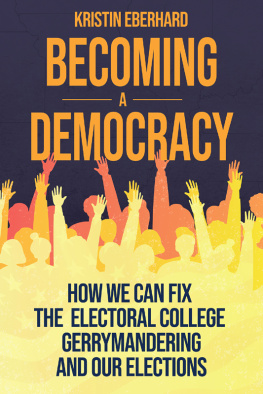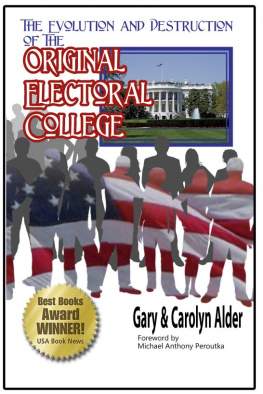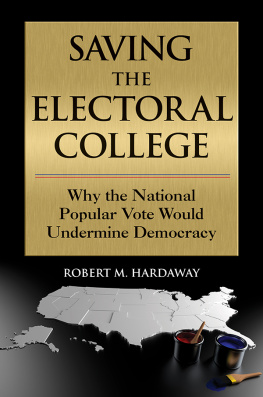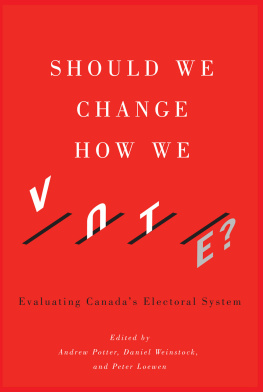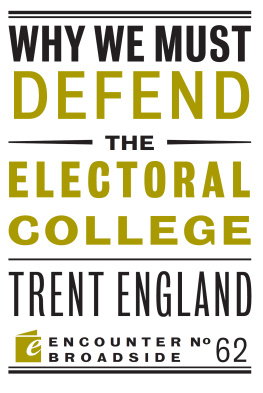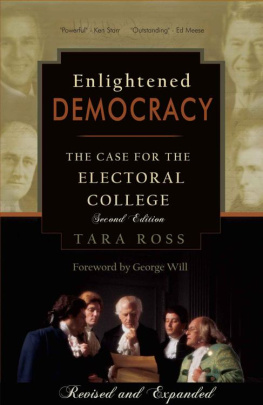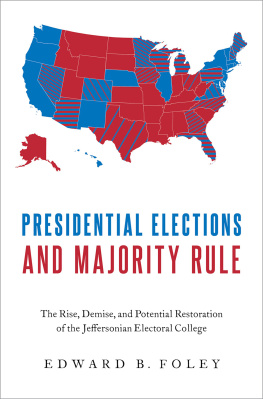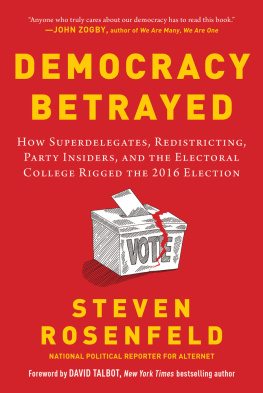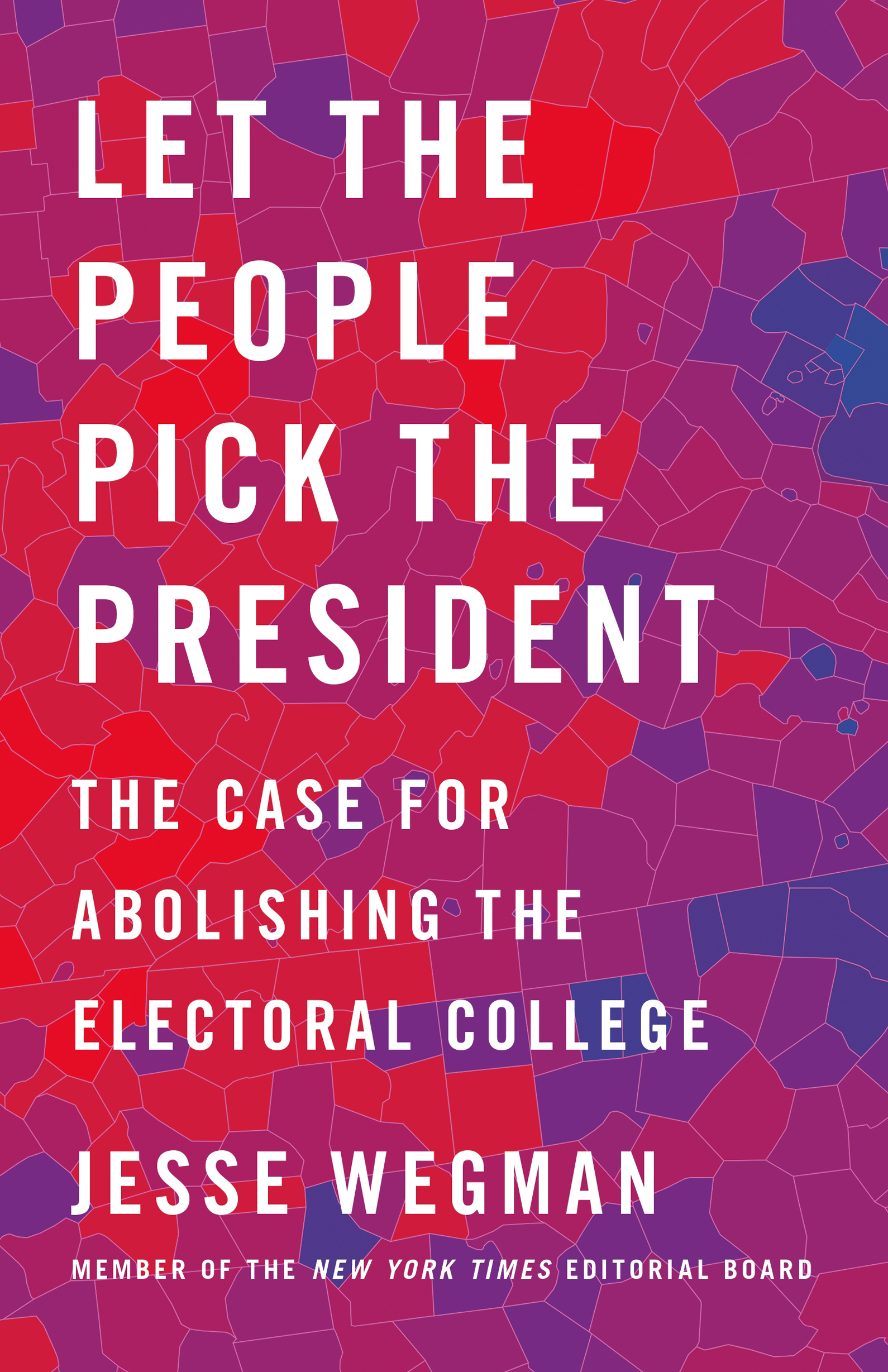The author and publisher have provided this e-book to you for your personal use only. You may not make this e-book publicly available in any way. Copyright infringement is against the law. If you believe the copy of this e-book you are reading infringes on the authors copyright, please notify the publisher at: us.macmillanusa.com/piracy.
E. B. W HITE
H. L. M ENCKEN
At 4:43 a.m. on November 9, 2016, Micheal Baca, a 24-year-old Democratic presidential elector from Colorado, sent an urgent text message to a friend. I have a plan, Baca wrote.
In retrospect, it was completely insane, but these were insane times.
A few hours earlier, Donald Trump, the Republican nominee for president, had stunned the world by pulling out what may be the most improbable election victory in American history. Trump was losing the popular vote to Hillary Clinton, the Democratic nominee, by more than two million votes, a margin that continued to grow as late returns rolled in. But hed won where it counted, in the Electoral College. Or he had appeared to.
Baca, a former marine who was earning a living in Denver that fall as a driver for Uber and Lyft, had no political experience. He knew one thing, though: You might think youre voting for the president when you cast a ballot, but youre not. Youre voting for Micheal Baca, or his Republican counterpart. Technically, the presidency wouldnt be decided until the 538 electors voted, as they were scheduled to do on December 19 in state capitals around the country.
The scheme came together quickly in Bacas mind, and he started testing it out. In a text to a fellow Democratic elector in Washington, Bret Chiafalo, he wrote, We can avoid Trump. But will need 37 Republicans to defect. Call me crazy but this needs to work.
Its a Hail Mary dude, Chiafalo wrote back. But its all we got.
In regular years, the electors vote is a formalitya ceremonial reaffirmation of the popular vote that most Americans ignore, if they are aware it is happening at all. But in 2016, for the fifth time in the nations history, the Electoral College and the popular vote didnt match, a phenomenon caused by so-called winner-take-all laws. These laws, used in nearly every state, are just what they sound like: they award all of a states electors to the candidate who earns the most popular votes in the state, no matter how close the margin. The key to Trumps win came in three statesPennsylvania, Wisconsin, and Michiganwhere he beat Clinton by a combined total of just under 78,000 votes out of more than 13 million cast. Thats less than the capacity of the University of Michigans football stadium, but it was enough, barely, to secure all of those states electors, cross the electoral vote majority threshold of 270, and claim the presidency.
Baca, like millions of other Americans in 2016, including some top Republicans, believed that Trump would be the least qualified president in history. And that wasnt counting the disturbing circumstances surrounding his victory, which included a coordinated cyberattack carried out by the Russian government on Trumps behalf and with his campaigns awareness. As new details of the Russian plot trickled out, Baca became certain that a Trump presidency posed an existential threat to the nation. The vote of the electors was the last thing standing between Trump and the Oval Office, and Baca was determined to keep him from ever getting there.
The good news was that the Constitutions framers had anticipated exactly this scenario. They knew that most people would not be well informed about national candidates and feared they would be easily taken in by a smooth-talking con artist. The Electoral College was the solution. In the Federalist no. 68, Alexander Hamilton wrote that the College would ensure that the office of President will never fall to the lot of any man who is not in an eminent degree endowed with the requisite qualifications. How? By entrusting the choice of the president to a select body of men in each statemen who would possess the information and discernment requisite to such complicated investigations. These electors, Hamilton assured his readers, would be most capable of analyzing the qualities adapted to the station, and acting under circumstances favorable to deliberation.
In other words, Hamilton was saying that the electors would think for themselves, reject unqualified candidates however popular they might be, and choose a leader who would govern in the best interests of the nation.
Inspiring words, and in the days after Trumps victory, more than a few shell-shocked liberals latched on to them. Baca and Chiafalo dubbed themselves Hamilton Electors and began working to persuade their Republican counterparts not to vote for Donald Trump but instead unite behind a compromise candidate who was actually qualified for the job.
As anti-Trump protestors took to the streets around the country, blocking traffic, chanting Not my president! and clashing with police, a quieter protest was developing largely behind closed doorsan unprecedented, loosely coordinated national effort to vindicate the framers vision, reverse the outcome of the election, and save the republic.
A petition posted on Change.org that called on Conscientious Electors to protect the Constitution from Donald Trump by switching their votes from Trump to Clinton drew nearly five million signatures.
Michael Signer, the mayor of Charlottesville, Virginia, at the time, and the author of books about demagogues and James Madison, published an article in Time magazine arguing that Republican electors owe it to all Americans to deliberate on their choice in the manner required by the Constitutionin short, to revolt against Trump.
A Harvard law professor named Lawrence Lessig said he had been told of 20 Republican electors, and possibly more, who were considering voting for someone other than Trump, although none ever publicly came forward.
A short video posted to YouTube and viewed more than 1.4 million times featured a solemn parade of TV and movie stars pleading with Republican electors to switch their votes. It opened with Martin Sheen, donning his spectacles and summoning the benevolent didacticism of his alter ego, President Jed Bartlet of The West Wing, a liberals fantasy chief executive who could recite the Federalist Papers in his sleep.
As you know, Sheen said, after quoting Hamilton, our founding fathers built the Electoral College to safeguard the American people from the dangers of a demagogue.
The rest of the celebrities seemed to be trying to strike a tone somewhere between dire and apocalyptic. Im not asking you to vote for Hillary Clinton, several of them repeated. Any eligible person would do. They assured the electors that by voting [their] conscience they would go down in history as brave and heroic patriots. The overall effect sounded like a group of hostages trying to sweet-talk their kidnapper into putting down the gun.
The problem was that the Electoral College has almost never operated as Alexander Hamilton pictured it would. Not since 1792 have electors been independent, deliberative actors who saw their task as picking the fittest person for the job. There isnt even one single body of electors. Instead, each presidential candidate has his or her own slate of electors tapped by local party leaders for nothing but their partisan loyalty. Whichever candidate wins a states popular vote sends all of his or her electors to the state capital, where they cast their ballots for that candidate. And just in case any of them should get a notion to vote for someone else, most states have laws prohibiting them from doing so.


